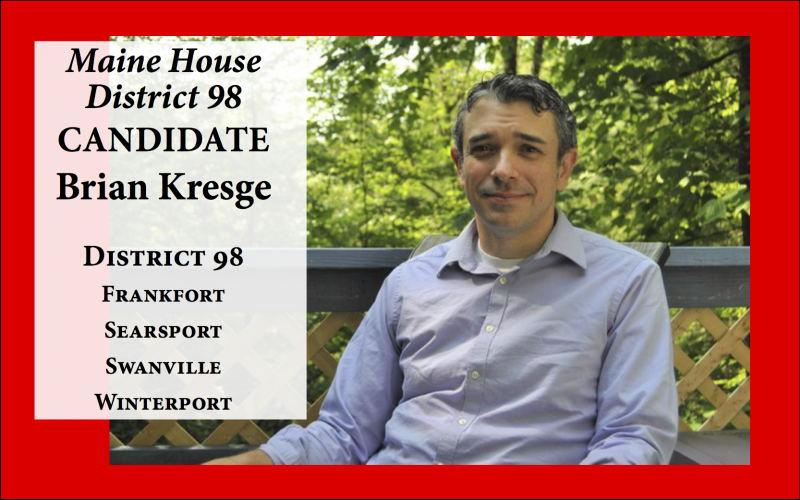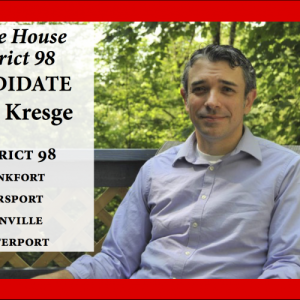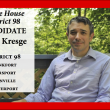Q&A: Maine House District 98 Candidate Brian Kresge
Brian Phillip Kresge, R-Winterport: I am originally from Lancaster, Pennsylvania. I enlisted in the U.S. Army at 18, served as an infantryman and paratrooper. I went to college and grad school while serving in the Army National Guard first in Pennsylvania, and continue to serve here in Maine’s National Guard. I work as a computer programmer and writer. I run because I believe in Judaism’s mandate “tikkun olam,” to repair the world. When there is so much child poverty in Waldo County and Maine, I feel compelled to try.
What are the three most pressing issues facing Maine today, and how would you like to see them resolved?
I believe healthcare, our rural access to services like internet, and taxes as being the most important issue in Maine today, at least as expressed by the people I talk to going door-to-door. Healthcare is tough. We need to find ways to help reduce costs in state, but we also need to support rural providers. Rural services like internet will go a long way to giving rural Mainers, even in Waldo County, access to markets and infrastructure they don’t presently have. Finally, we have every opportunity to alleviate the tax burden associated with living in Maine by seeking to legislatively lower the costs of activities carried out by Maine state government.
How will you protect the local (municipal) taxpayer as you help shape a state budget?
Trying to find ways to meet the state’s education funding burden will help, but defending our revenue sharing program, as our outgoing representative has, will be crucial.
Scientists have reported that the Gulf of Maine is warming (Gulf of Maine experiences marine heat wave, scientists say and Senators Collins, King push for research into warming of Gulf of Maine) How will you work to ensure that Maine’s fisheries are vital and productive, and that the habitat and marine life are protected?
I think we need to work with all relevant agencies. As a legislature, we’re not in as much control over climate affecting policy, but we will be left holding the bag to protect our industries. We know, for instance, that invasive green crabs threaten our shellfish industry. Towns like Freeport have feted studies and activities to mitigate that; the legislature should pick up some of that effort, because it will affect the entire coast. We must also try and expand Maine’s seafood industry. Aquaculture practices are far less environmentally intrusive than older operations on the west coast, and Maine is primed to be a significant player in this hemisphere — especially if we are mindful of how climate change stands to wound our capabilities.
What are your positions on energy policies and use of renewable energy (solar, wind, tidal turbine)? Should the state of Maine encourage renewables with tax and policy development?
I think we should play it by ear on investment. Some right now are heavily dependent on lower interest rates and capital investment, but that also goes for fossil fuel development (like shale gas). We’re starting to see private industry put considerable confidence in renewables; it’s time for Maine to consider this as well, when the cost/benefit ratio metes out.
Penobscot Bay Pilot has posed questions to each candidate running for District Attorney, Maine Senate and Legislature, providing the opportunity for the public to better understand their position on issues important to the state. The candidates have responded with their individual written answers.
How do you want to see Maine laws governing the commercial growth and sale of marijuana to evolve?
I am a libertarian at heart. I’d prefer to see limited regulation over a commercial industry. As it evolves, I’d like government to stand aside, except on issues of health and human safety; i.e. age limits, OUI, etc.
What issues are emerging from your conversations with the public as you go about your campaign, and what solutions do you envision?
Finding jobs, staying in homes, and affording accessible healthcare seem to be a common thread.
Voters approved expansion of Medicaid. How do you want to see that implemented and funded?
I frequently depart from my GOP peers in saying we should accept the expansion and implement it. We’re right to be wary, as the federal funding diminishes, we’re looking at millions that the state will be expected to step up. However, as someone that works with accountable care organizations, who are realizing net savings in the millions for Medicare patients, we can also see about streamlining care in similar ways via mandate. We need to ensure we’re bringing small-time providers along for the ride, of course. Bottom line is that I doubt we’re going to see anything in the next two to four years from the federal government, so we must try our best to handle our healthcare market internally.
What is your position on the proposed 145-mile Central Maine Power transmission line that the company hopes to build from Quebec, through Beattie Township, and the expansion of 92 miles of existing corridor to Lewiston, and another 26.5 miles from Windsor to Wiscasset?
I support this, but I’m deferring to the Lewistown City Council and others in the affected region who support it.
Two young Maine children were killed under horrific circumstances in 2017. How would you improve the caliber of DHHS, specifically child protective services?
The death of the child down the road in Stockton Springs hit us very hard emotionally. DHHS has a thankless task, one that requires so many hours. The opioid crisis and shortage of foster parents/foster homes certainly doesn’t provide them a lot of options in removing children from dangerous situations, if they can identify them to begin with. A good first step would be to increase throughput of telephonic reporting. As someone who looks to the bottom line, if we can bolster their funding at the expense of a less necessary budget line item, I think we should.
What committees would you like to serve on and why?
Energy, Utilities and Technology, or Environment and Natural resources, and Veterans and Legal Affairs would be my preferred. As a computer programmer, technology is in my wheelhouse. As a long time Sierra Club member and conservationist, the environment is important to me. And as a Veteran (and current service member) who has worked tirelessly for wounded warriors and veterans caught up in the criminal justice system or cycles of addiction, this is an emotional cause for me.
Maine’s economy relies on small and micro-businesses. How will you help the entrepreneur succeed in this state?
Diminishing the regulatory footprint and reducing taxes are always a good start. There may also be instances where state programs can or already do provide start up capital for specific industries, such as first crop seed money for new farmers, etc.
Does Maine have enough mental health care resources? If not, what needs to improve and how?
I don’t believe that we do.
1. We can make treatment more accessible. We tend to focus on availability of beds, but that is often a holding action for the absence of actual care. We need to find ways to recruit mental health providers to Maine.
2. If you have ever had a loved one in mental health care anywhere, you see the profound disconnect between inpatient and outpatient care. People released from care often fall off the radar. We need our system to be able to sustain care after release.
3. Release from incarceration needs to be paired with services outside of prison to reduce mental health related recidivism.
4. Better training for first responders so we don’t end up arresting mentally ill people.
What is your vision for affordable health care?
We tend to focus on affordability, which is certainly a pressing concern given insurance premiums and deductibles. Full disclosure: one of my clients is an association of Accountable Care Organizations, a feature of “Obamacare” that has realized real savings for Medicare patients, while increasing quality of care. I have access to their metrics. Reducing cost by exploiting efficiencies not only reduces the cost burden CMS tracks for Medicare, but it makes happier patients. One ACO in Maine with 12,000 Medicare patients saved $9 million. That’s incredible. But small, rural providers suffer from a lack of access to Internet-based systems, and many providers are getting out of insurance altogether. This buttonhooks with my goal of boosting and building Internet access for all Mainers. There is so much we can do. We shouldn’t wait for the federal government here when we can do so much for our own healthcare market.
Maine has built up a fiscal surplus. How should it be used?
It should be returned pro rata to our taxpayers. If it is not consumed in our budget, it doesn’t belong to us, it belongs to the payers.
What are your positions on the following November ballot questions?
Question 1: “Do you want to create the Universal Home Care Program to provide home-based assistance to people with disabilities and senior citizens, regardless of income, funded by a new 3.8% tax on individuals and families with Maine wage and adjusted gross income above the amount subject to Social Security taxes, which is $128,400 in 2018?”
This is at least a $5,000 tax we’re talking about. For my family, which may or may not come close to OASDI, this would have an impact on our own insurance spending. I’m on TriCare now, but when I retire from the military, our insurance premiums double, our deductible quadruples, and $5,000 out of my pocket would cover my deductible for the year. That’s taking away from my daughters’ college savings, or even just being able to provide them the kind of opportunities for Jewish camp and such that I have worked incredibly hard to give them. The reflexive notion that people at these income levels can afford a tax is disgusting.
And there’s no indication that this program’s funding would work or even go to the things it goes to. I’m also highly concerned about a tax being levied by ballot referendum. This is why we have a legislature, to ensure that the majority doesn’t run rampant with populist ideals over the few. It’s precipitous, it’s ill conceived, and I will fight its implementation tooth and nail in the legislature.
Question 2: “Do you favor a $30,000,000 bond issue to improve water quality, support the planning and construction of wastewater treatment facilities and assist homeowners whose homes are served by substandard or malfunctioning wastewater treatment systems?”
I think this is a relatively innocuous bond issue, and I will vote Yes. An investment at this level is much more tenable than municipalities taking on the burden of these improvements; less impact on indigent residents.
Question 3:“Do you favor a $106,000,000 bond issue, including $101,000,000 for construction, reconstruction and rehabilitation of highways and bridges and for facilities and equipment related to ports, piers, harbors, marine transportation, freight and passenger railroads, aviation, transit and bicycle and pedestrian trails, to be used to match an estimated $137,000,000 in federal and other funds, and $5,000,000 for the upgrade of municipal culverts at stream crossings?”
I’m on the fence as of right now.
Question 4:“Do you favor a $49,000,000 bond issue to be matched by at least $49,000,000 in private and public funds to modernize and improve the facilities and infrastructure of Maine's public universities in order to expand workforce development capacity and to attract and retain students to strengthen Maine's economy and future workforce?”
No. I prefer a smaller footprint as of right now. I haven’t seen data that pairs this level of bond issuance to workforceneedsin Maine.
Question 5:“Do you favor a $15,000,000 bond issue to improve educational programs by upgrading facilities at all 7 of Maine's community colleges in order to provide Maine people with access to high-skill, low-cost technical and career education?”
Yes. Unliked Question 4, there’s a stronger case for investment at the community college level in vocational workforce development.
Event Date
Address
United States

























